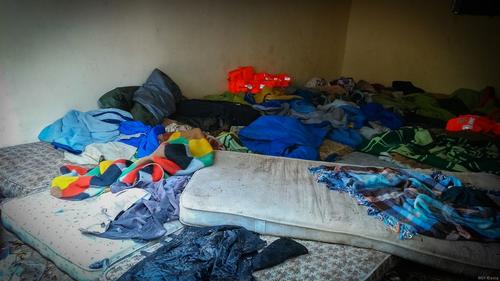A 145% jump was recorded in January and the number continues to rise
Athens – More and more Syrians fleeing war and violence are now using the east Mediterranean Sea route to reach Europe, resulting in an unprecedented number of refugees arriving in Greece’s Dodecanese islands, says Médecins Sans Frontières (MSF). Arriving migrants, asylum seekers and refugees are left with poor accommodating conditions and limited access to healthcare. A functioning reception system is urgently needed to adequately receive these people.
The MSF team providing care to refugees on the Greek islands has witnessed an increasing number of refugees arriving the Dodecanese islands since mid-March. There has been approximately an average of 100 refugees entering Greece from the islands per day the last weeks, reaching the same level as the number of arrivals recorded in the peak months last summer. More than 450 people arrived in January, and yesterday 180 refugees arrived in one day. Majority of the refugees are Syrians, other nationalities include people from Afghanistan and Sub Saharan African. Closure of EU external land borders leave no choice to refugees and migrants but to use the sea as their main route to apply for asylum in Europe.
“There is no reception system in place. In Leros, a reception facility was made available but has been left unused. And in Kos, in the first week of April, the police station was crammed with more than 200 people including pregnant women and children. They stayed in awfully small space and were offered very limited assistance,” said Stathis Kyrousis, MSF head of mission in Greece. Some of the migrants had to sleep in the courtyard in the police station during the night whilst they waited for the administrative procedures to be completed. “People should be provided with shelter, toilets, receive organised food distribution and have access to basic healthcare.”
MSF returned to the Greek islands in mid-February to provide medical care and distribute essential relief items to refugees, asylum seekers and migrants who arrive in small boats from crossing the Aegean Sea in search of protection in Europe. Since its first intervention in the islands last year and despite of several requests addressed to relevant Ministries, MSF has seen no improvement in the situation and a lack of political willingness to make significant changes in the provision of assistance to the refugees.
According to the latest figures from the authorities, there was an increase of 145% (from 186 to 457) of people arriving in Dodecanese islands in January as compared with the same month in 2014. Overall in Greece, the number of new arrivals has been increasing from 1,070 in the last week of February to 2,212 in the last week of March.
Whilst the number of people arriving in Italy via the Central Mediterranean route from Libya rose in the first two months of this year (in January by 59% and in February by 33%), there was a significant drop (59%) in the number of people who arrived via this route in March.
MSF is extremely worried that the situation in the Greek islands will only get worse if nothing will be done to prepare for the upcoming influx. The Greek authorities and EU must urgently agree a contingency plan to cope with the needs that may emerge from this potential new trend. “We are not yet in the peak season which usually falls from July to September. This certainly has rung the alarm bells for all of us that more people will need to be assisted in the summer months to come,” said Kyrousis.
“We see there is a possible shift in the migration trend which is due to the growing instability in Libya and the visa restrictions imposed on Syrians by Algeria and Lebanon. We don’t see as many Syrians as before at landings in Italy these days,” said Manu Moncada, MSF’s operations coordinator for migration. Syrians are left with very few options to reach Europe in search of protection, he said.
Currently in Kos, the MSF team is conducting vulnerability screenings to identify the most vulnerable groups like pregnant women and minors, and providing medical consultations. From mid-March to the beginning of April, MSF has conducted around 500 consultations and has distributed 500 kits of relief items such as soaps, combs, toothbrushes and towels, as well as 1,100 sleeping bags and 300 emergency blankets.




